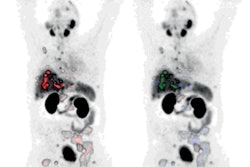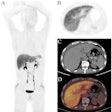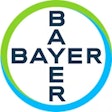Personalized medicine is rapidly evolving in cancer theranostics, with technology now available that allows clinicians to optimize doses of radiopharmaceuticals on an individual patient level, according to experts.
Leading the way are medical physicists such as Pat Zanzonico, PhD, and Adam Kesner, PhD, of Memorial Sloan Kettering Cancer Center in New York City, who discussed efforts in the field in a recent interview with AuntMinnie.com.
“In radiopharmaceutical therapy, we have the ability now to quantitate, to measure the uptakes of the therapeutic drugs, the radiopharmaceuticals, in normal tissues at risk and in target tissues, most commonly tumors,” Zanzonico explained.
Zanzonico, who recently penned a review on the subject published in the American Journal of Roentgenology, added that while radiopharmaceutical therapy isn’t new, the development of recent treatments such as lutetium-177 prostate-specific membrane antigen (PSMA)-617 (Pluvicto, Novartis) has catalyzed interest in the field.
“Now you have many, many thousands, tens of thousands, potentially hundreds of thousands of patients who are amenable to that therapy. And to really optimize it, you would like to be able to deliver it in a personalized manner,” he said.
Kesner recently wrote an article about software applications in the field that was published in the Journal of Nuclear Medicine. He noted that while dosimetry for Lu-177-labeled treatments is still not routinely performed in many nuclear medicine departments, cleared software for it is currently available both in the U.S. and Europe, with more in development.
However, while all the components for optimizing dosimetry are available, hurdles remain, such as making the tools convenient and easy to use, as well as creating standardized procedures and protocols to unify measurements across different centers in different locations, Kesner said.
“It is a developing area that is exciting and I think we're going to see in the next few years a new modern field take shape, supported by much of these dosimetry software solutions,” Kesner said.
You can listen to the entire interview below.




















